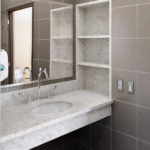Natural Stone Countertops
Natural stone is a product of nature and encompasses many types of stone including granite, limestone, marble, onyx, quartzite, semi-precious, slate, soapstone, travertine and others. Natural stone countertops are quarried from the earth, each piece has its own unique visual appearance – the key characteristic that makes natural stone so desirable.
Along with distinct character and one-of-a-kind beauty, natural stone offers varying levels of inherent durability and can be used in many applications from kitchen countertops to wall cladding.


















